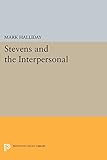Stevens and the Interpersonal / Mark Halliday.
Material type: TextSeries: Princeton Legacy Library ; 1211Publisher: Princeton, NJ : Princeton University Press, [2014]Copyright date: ©1991Edition: Course BookDescription: 1 online resource (206 p.)Content type:
TextSeries: Princeton Legacy Library ; 1211Publisher: Princeton, NJ : Princeton University Press, [2014]Copyright date: ©1991Edition: Course BookDescription: 1 online resource (206 p.)Content type: - 9780691605241
- 9781400862245
- 811.52 20
- PS3537.T4753
- online - DeGruyter
- Issued also in print.
| Item type | Current library | Call number | URL | Status | Notes | Barcode | |
|---|---|---|---|---|---|---|---|
 eBook
eBook
|
Biblioteca "Angelicum" Pont. Univ. S.Tommaso d'Aquino Nuvola online | online - DeGruyter (Browse shelf(Opens below)) | Online access | Not for loan (Accesso limitato) | Accesso per gli utenti autorizzati / Access for authorized users | (dgr)9781400862245 |
Browsing Biblioteca "Angelicum" Pont. Univ. S.Tommaso d'Aquino shelves, Shelving location: Nuvola online Close shelf browser (Hides shelf browser)

|

|

|

|

|

|

|
||
| online - DeGruyter Aestheticism and Deconstruction : Pater, Derrida, and de Man / | online - DeGruyter Neverending Stories : Toward a Critical Narratology / | online - DeGruyter The Skeptic Disposition : Deconstruction, Ideology, and Other Matters / | online - DeGruyter Stevens and the Interpersonal / | online - DeGruyter Practicing Romance : Narrative Form and Cultural Engagement in Hawthorne's Fiction / | online - DeGruyter Imagining Language in America : From the Revolution to the Civil War / | online - DeGruyter Authorship and Audience : Literary Performance in the American Renaissance / |
Frontmatter -- CONTENTS -- ACKNOWLEDGMENTS -- INTRODUCTION -- CHAPTER ONE. Stevens and the Suffering of Others -- CHAPTER TWO. Stevens and Heterosexual Love -- CHAPTER THREE. Stevens and Solitude -- CHAPTER FOUR. Stevens and the Reader -- NOTES -- INDEX OF WORKS BY WALLACE STEVENS -- INDEX OF PERSONS
restricted access online access with authorization star
http://purl.org/coar/access_right/c_16ec
With Wallace Stevens emerging as a father figure for American poetry of the late twentieth century, Mark Halliday argues that it is time for this "poet of ideas" to undergo an ethical critique. In this bold, accessible reconsideration of Stevens' work, he insists on the importance of interpersonal relations in any account of human life in the modern world. Although Stevens outwardly denies aspects of life that center on such relations as those between friends, lovers, family members, and political constituents, Halliday uncovers in his poetry an anxious awareness of the importance of these relations. Here we see the difficulties Stevens made for himself in wanting to offer a thoroughly satisfying version of secular spiritual health in the modern world without facing up to the moral and psychological implications of his own interpersonal needs, problems, and responsibilities. The final chapter reveals, however, an unusually encouraging "avuncular" attitude toward the reader of the poetry, which may be felt to redeem Stevens from the alienation observed earlier. Halliday develops his views by way of comparisons between Stevens and other poets, especially Thomas Hardy, Emily Dickinson, Robert Frost, and John Ashbery.Originally published in 1991.The Princeton Legacy Library uses the latest print-on-demand technology to again make available previously out-of-print books from the distinguished backlist of Princeton University Press. These editions preserve the original texts of these important books while presenting them in durable paperback and hardcover editions. The goal of the Princeton Legacy Library is to vastly increase access to the rich scholarly heritage found in the thousands of books published by Princeton University Press since its founding in 1905.
Issued also in print.
Mode of access: Internet via World Wide Web.
In English.
Description based on online resource; title from PDF title page (publisher's Web site, viewed 30. Aug 2021)


